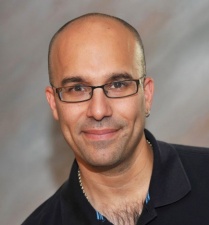BBC interviews Gokcumen on Neolithic transition
The Neolithic ushered in dramatic changes: civilisations with large populations, advancements in technology, arts and trade. But with the advent of agriculture, humans also began to experience malnutrition, starvation and epidemic diseases. The BBC explores the question "Was this humanity's biggest mistake?" in a short video program that includes an interview with Omer Gokcumen. See BBC REEL.

Omer Gokcumen

Omer Gokcumen
PhD
Research Interests
Human and primate evolution, ancient humans (including Neanderthals and Denisovans), anthropological genomics
Education
- PhD, University of Pennsylvania
- Postdoctoral Research, Harvard Medical School
Research Statement
Omer Gokcumen is an expert in evolutionary anthropology — the study of how humans evolved and how they differ from non-human primates such as gorillas and chimpanzees. His work is tied to human evolution, including evolutionary adaptation and the evolutionary processes that lead to genetic disease.
Gokcumen’s research examines the role that genomic variants, especially deletions and duplications, play in human disease and biology. His laboratory investigates the evolutionary history of genetic variations tied to interesting traits and diseases in modern and ancient human populations.
- 2022 Interview for BBC 4 - Inside Science on our work on evolution of mucus. (here)
- 2022 Interviewed for NPR - RadioLab. “Neanderthals’ revenge” episode on our work on ancient alleles in the human genome. (here)
- 2021 Interviewed for Scientific American on our work on the evolution of human growth hormone receptor. (here)
- 2021 Interviewed for The Scientist on our work on the evolution of human growth hormone receptor. (here)
- 2021 Quoted in How Stuff Works - “How human are humans?” by Joanna Thompson. (here)
- 2020 BBC - Reel
- 2019 Quoted in NYTimes.
- 2022 Pajic et al. A mechanism of gene evolution generating mucin function. Press release. Selected highlights: New Scientist, Yahoo News, BBC, GEN, Inverse.
- 2021 Saitou et al. Sex-specific phenotypic effects and evolutionary history of an ancient polymorphic deletion of the human growth hormone receptor. Press release. Selected highlights: Real Clear Science, The Scientist, Scientific American.
- 2020 Saiotu et al. Functional Specialization of Human Salivary Glands and Origins of Proteins Intrinsic to Human Saliva. Press release. Selected Highlights: Cosmos, CBC- Radio Active.
- 2020 Taskent et al. Analysis of haplotypic variation and deletion polymorphisms point to multiple archaic introgression events, including from Altai Neanderthal lineage. Press release. Selected Highlights: Futurity, Sputnik, Genetic Literacy Project.
Selected Publications
- Yilmaz, F., Karageorgiou, C.*, Kwondo, K., Pajic P.*, Scheer, K.*, HGSV Consortium, Beck, C., Torregrossa, A-M., Lee, C., Gokcumen, O.* (2024). Reconstruction of the human amylase locus reveals ancient duplications seeding modern-day variation. Science. 386: eadn0609
- Russel, M., Aqil, A*., Saitou, M., Gokcumen, O*, Naoki, M. (2023) Gene communities in co-expression networks across different tissues. PloS Computational Biology. 19(11): e1011616. [co-Corresponding Author].
- Veilleux, C.C., Garrett, E.C., Pajic, P.*, Saitou, M.*, Ochieng, J., Dagsaan, L.D., Dominy, N.J., Perry, G.H., Gokcumen, O.*, Melin, A.D. (2023). Veillex Human subsistence and signatures of selection on chemosensory genes. Communications Biology. 6: 683. [co-Corresponding Author].
- Aqil, A.*, Pavlos, P., Speidel, L. Gokcumen, O.* Balancing selection on genomic deletion polymorphisms in humans. (2023). eLife. e79111
- Pajic, P.*, Shen, S., Qu, J., May, A.J., Knox, S., Ruhl, S., Gokcumen, O.* (2022) A mechanism of gene evolution generating mucin function. Science Advances. 8: 34.
- Saitou, M.*, Masuda, N., Gokcumen, O.* (2022). Similarity-based analysis of allele frequency distribution among multiple populations identifies adaptive genomic structural variants. Molecular Biology and Evolution. 39: msab313.
- Saitou, M.*, Resendez, S.*, Pradhan, A.J., Wu, F., Lie, N.C., Hall, N.J., Zhu, Q., Reinholdt, L. Satta, Y., Speidel, L., Nakagome, S., Hanchard, N. A., Churchill, G., Lee, C., Atilla-Gokcumen, G. E., Mu, X., Gokcumen, O.* (2021). Sex-specific phenotypic effects and evolutionary history of an ancient polymorphic deletion of the human growth hormone receptor. Science Advances. 7, eabi4476.
- Saitou, M.*, Gaylord, E., Xu, D., Neznanova, L., Nathan, S., Grawe, A., Chang, J., Ryan, William., Ruhl, S., Knox, S.M., and Gokcumen, O.* (2020). Functional Specialization of Human Salivary Glands and Origins of Proteins Intrinsic to Human Saliva. Cell Reports. 33, 108402.
- Taskent, O.*, Yen Lung Lin, Patramanis, I., Pavlidis, P., Gokcumen, O.* (2020). Analysis of haplotypic variation and deletion polymorphisms point to multiple archaic introgression events, including from Altai Neanderthal lineage. Genetics. 215: 497-509.
- Pajic, P.*, Pavlidis, P., Dean, K., Neznanova, L., Daugherity, E., Romano R-A., Garneau, D., Globig, A., Ruhl, S., Gokcumen, O.* (2019). Independent amylase gene copy number bursts correlate with dietary preferences in mammals. eLife.
- Lin, Y.-L.*, & Gokcumen, O.* (2019). Fine-Scale Characterization of Genomic Structural Variation in the Human Genome Reveals Adaptive and Biomedically Relevant Hotspots. Genome Biology and Evolution, 11(4), 1136–1151.
- Saitou, M.*, Lizardo, D., Taskent, R. O.*, Millner, A., Gokcumen, O.*, Atilla-Gokcumen, G. (2018). An evolutionary transcriptomics approach links CD36 to membrane remodeling in replicative senescence. Mol Omics 14, 237 [Cover article, co-Corresponding Author].
- Xu, D.*, Pavlidis, P., Taskent*, R.O., Alachiotis, N., Flanagan. C.*, DeGiorgio, M., Ruhl, S., Gokcumen, O.* (2017). Archaic hominin introgression in Africa contributes to functional salivary MUC7 genetic variation. Mol Biol Evol. 34: 2704